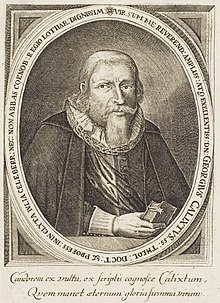| Georg Calixtus Kallisøn/Kallisön Callisen | |
|---|---|
 Georg Calixtus Georg Calixtus | |
| Born | 14 December 1586 |
| Died | 19 March 1656 |
| Nationality | German |
| Occupation | Lutheran theologian |
Georg Calixtus, Kallisøn/Kallisön, or Callisen (14 December 1586 – 19 March 1656) was a German Lutheran theologian who looked to reconcile all Christendom by removing all differences that he deemed "unimportant".
Biography
Calixtus was born in Medelby, Schleswig. After studying philology, philosophy and theology at Helmstedt, Jena, Giessen, Tübingen and Heidelberg, he travelled through Holland, France and England, where he became acquainted with the leading reformers. On his return in 1614, he was appointed professor of theology at Helmstedt by the duke of Brunswick, who had admired the ability he displayed when a young man in a dispute with the Jesuit Augustine Turrianus.
Learning different Protestant and Roman Catholic teachings, he tried to create a "unifying theology". In 1613 he published a book, Disputationes de Praecipuis Religionis Christianae Capitibus, which provoked the hostile criticism of orthodox Lutheran scholars; in 1619 he published his Epitome theologiae, and some years later his Theologia Moralis (1634) and De Arte Nova Nihusii. Roman Catholics felt them to be aimed at their own system, but they gave so great offence to Lutherans as to induce Statius Buscher to charge the author with a secret leaning to Catholicism.
Scarcely had he refuted the accusation of Buscher, when, on account of his intimacy with the Reformed divines at the conference of Thorn (1645), and his desire to effect a reconciliation between them and the Lutherans, a new charge was leveled against him, principally by Abraham Calovius (1612-1686), of a secret attachment to Calvinism.
Thus the great aim of his life to reconcile Christendom by removing all unimportant differences, resulted in him being accused of syncretism for the ecumenical spirit in which he treated both Catholics and Calvinists, and for considering the Apostles' Creed a broad enough basis for Christian union and communion, which might embrace both. The disputes to which his attitude gave rise lasted during his whole lifetime.
His friends, however, stood by him, and he retained the position he held in the Lutheran Church, teaching theology at the University of Helmstedt until his death. For all of the legitimate controversy surrounding him, he continues to be recognized for his emphasis on the desire for the unity of Christianity.
Calixtus died in Helmstedt.
The term Consensus Quinquesaecularis, initially a contemptuous reference to the high value which Calixtus placed on an alleged consensus of the Church Fathers of the first five centuries of Christendom, and certainly a key aspect of his "unifying theology", later became popular with various old High Church divines such as some Anglican Latitudinarians.
Works

Modern editions of selected works are available in Georg Calixt, Werke in Auswahl, 4 vols, ed. Inge Mager (Göttingen: Vandenhoeck & Ruprecht, 1970–82).
- De praecipuis Christianae religionis capitibus hodie controversis disputationes XV Helmstedt, 1613
- Epitome Theologiae Goslar, 1619
- De vera christiana religione et ecclesia Helmstedt, 1633
See also
References
- ^
 One or more of the preceding sentences incorporates text from a publication now in the public domain: Chisholm, Hugh, ed. (1911). "Calixtus, Georg". Encyclopædia Britannica. Vol. 5 (11th ed.). Cambridge University Press. pp. 54–55.
One or more of the preceding sentences incorporates text from a publication now in the public domain: Chisholm, Hugh, ed. (1911). "Calixtus, Georg". Encyclopædia Britannica. Vol. 5 (11th ed.). Cambridge University Press. pp. 54–55.
- Gilman, D. C.; Peck, H. T.; Colby, F. M., eds. (1905). "Calixtus, Georg" . New International Encyclopedia (1st ed.). New York: Dodd, Mead.
- Consensus Quinquesaecularis article in Christian Cyclopedia
Further reading
- Baur, Jörg (2003), "Die Helmstädter Lesart des Rechtfertigungsartikels und deren rechtgläubige Kritiker. Eine Untersuchung zur Genese des 'synkretistischen Streites.'", in Sträter, Udo; Appold, Kenneth G. (eds.), Zur Rechtfertigungslehre in der Lutherischen Orthodoxie. Beiträge des sechsten Wittenberger Symposiums zur Lutherischen Orthodoxie, Leucorea-Studien zur Geschichte der Reformation und der Lutherischen Orthodoxie, vol. 2, Leipzig, pp. 81–135
{{citation}}: CS1 maint: location missing publisher (link) - Böttigheimer, Christoph (1996), Zwischen Polemik und Irenik, Münster: Verlag
- Callisen, Christian Thorsten (2012). "Georg Calixtus, Isaac Casaubon, and the consensus of antiquity". Journal of the History of Ideas. 73 (1): 1–23. doi:10.1353/jhi.2012.0007. S2CID 142726832.
- Callisen, Christian Thorsten (2014), "'To the great aid of our memory': Georg Calixtus on the study of history", in Callisen, Christian Thorsten (ed.), Reading and Writing History from Bruni to Windschuttle: Essays in Honour of Gary Ianziti, Farnham and Burlington, VT: Ashgate, pp. 105–124
- Engel, Peter, Die eine Wahrheit in der gespaltenen Christenheit. Untersuchungen zur Theologie Georg Calixts
- Gaß, Wilhelm (1876), "Calixt, Georg", Allgemeine Deutsche Biographie, vol. 3, Leipzig: Duncker & Humblot, pp. 696–704
- Gaß, Wilhelm (1846), Georg Calixtus und der Synkretismus, Breslau
- Mager, Inge (1981), "Die Beziehung Herzog Augusts von Braunschweig-Wolfenbüttel zu den Theologen Georg Calixt und Johann Valentin Andreae", Pietismus und Neuzeit VI., pp. 76–99
- Merkt, Andreas (2001), Das patristische Prinzip, Leiden: Brill
- Schüssler, Hermann (1957), "Calixt, Georg", Neue Deutsche Biographie (NDB), vol. 3, Berlin: Duncker & Humblot, p. 96
- Schüssler, Hermann (1961), Georg Calixt. Theologie und Kirchenpolitik, Franz Steiner Verlag
- Wallmann, Johannes (1981), "Calixt, Georg", Theologische Realenzyklopädie (TRE), vol. 7, Berlin/New York: de Gruyter, pp. 552–559
- Wallmann, Johannes (1961), Der Theologiebegriff bei Johann Gerhard und Georg Calixt, Tübingen
- Henke, Ernst Ludwig Theodor (1860) , Georg Calixtus und seine Zeit (2 Volumes ed.), Halle (Saale)
- 1586 births
- 1656 deaths
- People from Schleswig-Flensburg
- 17th-century writers in Latin
- German Lutheran theologians
- People from the Duchy of Schleswig
- Academic staff of the University of Helmstedt
- 17th-century German Protestant theologians
- German male non-fiction writers
- 17th-century German male writers
- 16th-century Lutheran theologians
- 17th-century Lutheran theologians